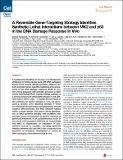| dc.contributor.author | Reinhardt, H. Christian | |
| dc.contributor.author | Kim, Jacob S. | |
| dc.contributor.author | Ruf, Daniela M. | |
| dc.contributor.author | Mitra, Tanya | |
| dc.contributor.author | Couvillon, Anthony D. | |
| dc.contributor.author | Yaffe, Michael B. | |
| dc.contributor.author | Cannell, Ian Gordon | |
| dc.contributor.author | Reinhardt, H. Christian | |
| dc.contributor.author | Kim, Jacob S. | |
| dc.contributor.author | Ruf, Daniela M. | |
| dc.contributor.author | Morandell, Sandra M. | |
| dc.contributor.author | Jacks, Tyler E | |
| dc.contributor.author | Yaffe, Michael B | |
| dc.date.accessioned | 2014-10-02T18:43:04Z | |
| dc.date.available | 2014-10-02T18:43:04Z | |
| dc.date.issued | 2013-11 | |
| dc.date.submitted | 2013-09 | |
| dc.identifier.issn | 22111247 | |
| dc.identifier.uri | http://hdl.handle.net/1721.1/90556 | |
| dc.description.abstract | A fundamental limitation in devising new therapeutic strategies for killing cancer cells with DNA damaging agents is the need to identify synthetic lethal interactions between tumor-specific mutations and components of the DNA damage response (DDR) in vivo. The stress-activated p38 mitogen-activated protein kinase (MAPK)/MAPKAP kinase-2 (MK2) pathway is a critical component of the DDR network in p53-deficient tumor cells in vitro. To explore the relevance of this pathway for cancer therapy in vivo, we developed a specific gene targeting strategy in which Cre-mediated recombination simultaneously creates isogenic MK2-proficient and MK2-deficient tumors within a single animal. This allows direct identification of MK2 synthetic lethality with mutations that promote tumor development or control response to genotoxic treatment. In an autochthonous model of non-small-cell lung cancer (NSCLC), we demonstrate that MK2 is responsible for resistance of p53-deficient tumors to cisplatin, indicating synthetic lethality between p53 and MK2 can successfully be exploited for enhanced sensitization of tumors to DNA-damaging chemotherapeutics in vivo. | en_US |
| dc.description.sponsorship | National Institutes of Health (U.S.) (Grant ES015339) | en_US |
| dc.description.sponsorship | National Institutes of Health (U.S.) (Grant GM60594) | en_US |
| dc.description.sponsorship | National Institutes of Health (U.S.) (Grant GM59281) | en_US |
| dc.description.sponsorship | National Institutes of Health (U.S.) (Grant CA112967) | en_US |
| dc.description.sponsorship | Janssen Pharmaceutical Ltd. | en_US |
| dc.description.sponsorship | Massachusetts Institute of Technology. Center for Environmental Health Sciences (Core Grant P30-CA14051) | en_US |
| dc.description.sponsorship | Massachusetts Institute of Technology. Center for Environmental Health Sciences (Core Grant ES-002109) | en_US |
| dc.language.iso | en_US | |
| dc.publisher | Elsevier | en_US |
| dc.relation.isversionof | http://dx.doi.org/10.1016/j.celrep.2013.10.025 | en_US |
| dc.rights | Creative Commons Attribution | en_US |
| dc.rights.uri | http://creativecommons.org/licenses/by-nc-nd/3.0/ | en_US |
| dc.source | Elsevier | en_US |
| dc.title | A Reversible Gene-Targeting Strategy Identifies Synthetic Lethal Interactions between MK2 and p53 in the DNA Damage Response In Vivo | en_US |
| dc.type | Article | en_US |
| dc.identifier.citation | Morandell, Sandra, H. Christian Reinhardt, Ian G. Cannell, Jacob S. Kim, Daniela M. Ruf, Tanya Mitra, Anthony D. Couvillon, Tyler Jacks, and Michael B. Yaffe. “A Reversible Gene-Targeting Strategy Identifies Synthetic Lethal Interactions Between MK2 and P53 in the DNA Damage Response In Vivo.” Cell Reports 5, no. 4 (November 2013): 868–877. | en_US |
| dc.contributor.department | Massachusetts Institute of Technology. Department of Biological Engineering | en_US |
| dc.contributor.department | Massachusetts Institute of Technology. Department of Biology | en_US |
| dc.contributor.department | Koch Institute for Integrative Cancer Research at MIT | en_US |
| dc.contributor.mitauthor | Morandell, Sandra | en_US |
| dc.contributor.mitauthor | Reinhardt, H. Christian | en_US |
| dc.contributor.mitauthor | Cannell, Ian Gordon | en_US |
| dc.contributor.mitauthor | Kim, Jacob S. | en_US |
| dc.contributor.mitauthor | Ruf, Daniela M. | en_US |
| dc.contributor.mitauthor | Mitra, Tanya | en_US |
| dc.contributor.mitauthor | Jacks, Tyler E. | en_US |
| dc.contributor.mitauthor | Yaffe, Michael B. | en_US |
| dc.relation.journal | Cell Reports | en_US |
| dc.eprint.version | Final published version | en_US |
| dc.type.uri | http://purl.org/eprint/type/JournalArticle | en_US |
| eprint.status | http://purl.org/eprint/status/PeerReviewed | en_US |
| dspace.orderedauthors | Morandell, Sandra; Reinhardt, H. Christian; Cannell, Ian G.; Kim, Jacob S.; Ruf, Daniela M.; Mitra, Tanya; Couvillon, Anthony D.; Jacks, Tyler; Yaffe, Michael B. | en_US |
| dc.identifier.orcid | https://orcid.org/0000-0001-5785-8911 | |
| dc.identifier.orcid | https://orcid.org/0000-0002-9547-3251 | |
| mit.license | PUBLISHER_CC | en_US |
| mit.metadata.status | Complete | |
